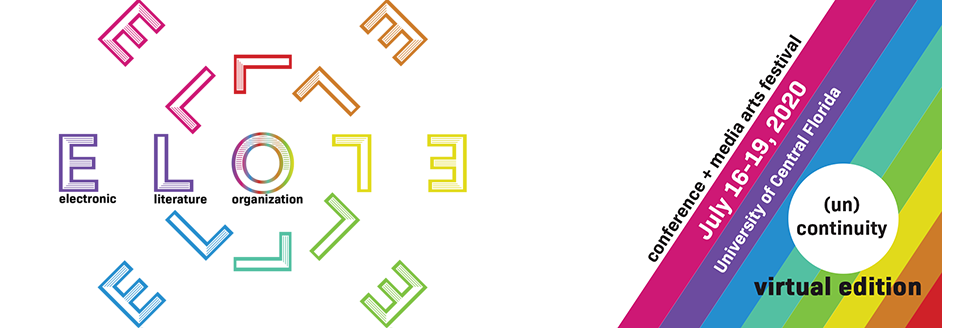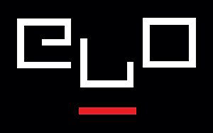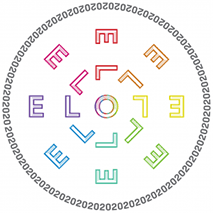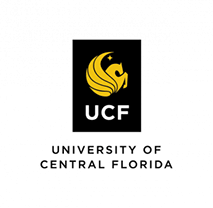Proposal Title
1990s Literary Hypertext in the 21st Century
Submission Type
Conference Talk - Panel
Abstract
This panel presents two contemporary research projects about 1990s hypertext literary works.
Presentation #1 discusses hypertext literature as print editions and digital versions, looking specifically at the work she has done to reorganize the numbering system for Michael Joyce’s hypertext novel, afternoon, a story for exhibition. Focusing on textual studies, archival research, platform studies, and digital preservation practices, the paper argues for a method of developing strategies that attend to a work’s specificity in regard to its textual and structural differences as well as those involved in its presentation and display. As the presenter argues, versioning works through careful consideration of material practices results in a better understanding of artistic creation and the affect technological development has upon that creation.
“Presentation #2 follows up the previous discussion of the form and function of Afternoon with a focus on a strikingly different work that was in production at around the same time, entangled with the story of what hypertext was in the 1980s and what it would become in the 90s. Sarah Smith’s King of Space (1991) was one of only three pieces produced by Eastgate Systems with its proprietary HyperGate software before it invested in Storyspace and proclaimed a focus on “serious hypertext.” Experimenting with the new affordances of the short-lived HyperGate system—which differs in important ways from the reading and composing environments of Storyspace—this work of feminist science fiction provides a wide array of narrative experiences, from the relatively traditional text paragraph to a full Tetris-like computer game. Throughout, it staunchly refuses to separate the ludic from the literary: “ALL TEXT IS A GAME” reads the main menu, and Smith has set out to prove it. In a way that still seems unique today, even its more traditional computer games ask players to fully engage with and refer to the textual narrative in which it is embedded. As a work that deliberately attempts to blur the lines between the ludic and the literary, or perhaps to do away with any such boundaries altogether, King of Space does not purport to be “serious hypertext” for the literary set, as evidenced by its interface design, navigation, and narrative structure; instead, it asks us to spend more time considering how computer games and literary texts are alike than how they are different, a timely and consequential consideration in 2020.”
At the core of their presentations lie research methodologies required for an in-depth examination of historical hypertext literature. The importance of archival research, platform studies, textual studies, interviews, feminist methods, and action research are emphasized; research practices are demonstrated.
For more information, visit http://dtc-wsuv.org/wp/elo2020-hypertext
1990s Literary Hypertext in the 21st Century
This panel presents two contemporary research projects about 1990s hypertext literary works.
Presentation #1 discusses hypertext literature as print editions and digital versions, looking specifically at the work she has done to reorganize the numbering system for Michael Joyce’s hypertext novel, afternoon, a story for exhibition. Focusing on textual studies, archival research, platform studies, and digital preservation practices, the paper argues for a method of developing strategies that attend to a work’s specificity in regard to its textual and structural differences as well as those involved in its presentation and display. As the presenter argues, versioning works through careful consideration of material practices results in a better understanding of artistic creation and the affect technological development has upon that creation.
“Presentation #2 follows up the previous discussion of the form and function of Afternoon with a focus on a strikingly different work that was in production at around the same time, entangled with the story of what hypertext was in the 1980s and what it would become in the 90s. Sarah Smith’s King of Space (1991) was one of only three pieces produced by Eastgate Systems with its proprietary HyperGate software before it invested in Storyspace and proclaimed a focus on “serious hypertext.” Experimenting with the new affordances of the short-lived HyperGate system—which differs in important ways from the reading and composing environments of Storyspace—this work of feminist science fiction provides a wide array of narrative experiences, from the relatively traditional text paragraph to a full Tetris-like computer game. Throughout, it staunchly refuses to separate the ludic from the literary: “ALL TEXT IS A GAME” reads the main menu, and Smith has set out to prove it. In a way that still seems unique today, even its more traditional computer games ask players to fully engage with and refer to the textual narrative in which it is embedded. As a work that deliberately attempts to blur the lines between the ludic and the literary, or perhaps to do away with any such boundaries altogether, King of Space does not purport to be “serious hypertext” for the literary set, as evidenced by its interface design, navigation, and narrative structure; instead, it asks us to spend more time considering how computer games and literary texts are alike than how they are different, a timely and consequential consideration in 2020.”
At the core of their presentations lie research methodologies required for an in-depth examination of historical hypertext literature. The importance of archival research, platform studies, textual studies, interviews, feminist methods, and action research are emphasized; research practices are demonstrated.
For more information, visit http://dtc-wsuv.org/wp/elo2020-hypertext




Bio
Dene Grigar is Director of the Electronic Literature Lab. She also serves as the Director of the Creative Media & Digital Technology Program at Washington State University Vancouver, with research focusing on the creation, curation, preservation, and criticism of Electronic Literature, specifically building multimedial environments and experiences for live performance, installations, and curated spaces; desktop computers; and mobile media devices. She has authored 14 media works, such as Curlew (with Greg Philbrook, 2014), “A Villager’s Tale” (with Brett Oppegaard, 2011), the “24-Hour Micro-Elit Project” (2009), When Ghosts Will Die (with Steve Gibson, 2005), “Fallow Field: A Story in Two Parts” (2004), and “The Jungfrau Tapes: A Conversation with Diana Slattery about The Glide Project” (2004), as well as four scholarly books and over 50 articles. She also curates exhibits of electronic literature and media art, mounting shows at the Library of Congress and for the Modern Language Association, among other venues. She serves as Associate Editor for Leonardo Reviews and President of the Electronic Literature Organization from 2013-2019. Her website is located at http://nouspace.net/dene.